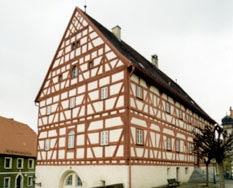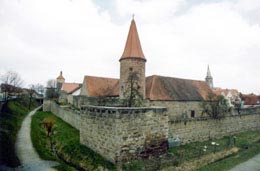|
|
 |
 |
 |
|
 Wolframs-Eschenbach Wolframs-Eschenbach
Wolfram of Eschenbach |
|
Wolfram of Eschenbach (born before 1200, died after 1217) is the greatest German-speaking poet and epicist of the Middle Ages. The poet is descended from the ministry officials’ family of the Noblemen of Eschenbach, which is detectable until the end of the 16th century. Wolfram of Eschenbach left three epic works – "Parzival”, "Willehalm” and "Titurel” –, which established his good reputation as great epicist of the Middle Ages.
|
|
 |
|
|
|
 |
|
Working as a medieval balladeer (minnesingers) Wolfram acquired fame with his aubades especially. For a longer time he found hospitable accommodation in the castle of Landgrave Hermann of Thuringia. But also in the Bavarian Forest in Heitstein castle, which belongs to the Landgrave of Vohburg, the sister of Ludwig dem Bayern (the Bavarian), he enjoyed hospitality.
In a castle called "Wildenberg” – probably Wehlenburg castle near the city of Ansbach – he lived together with his wife and child.
After his death Wolfram was buried in the Liebfrauen church of his hometown. His tomb existed until the beginning of the 17th century.
|
|
|
|
|
|
|
|

|
|
|
|
Local History of
Wolframs-Eschenbach |
|
Already in the 8th century a settlement with church and burial area is verifiable near Eschenbach brook.
Around 1212/20 the Teutonic Order settled in Eschenbach and founded an administrative order district.
In 1332 the Teutonic Order obtained municipal law by Emperor Ludwig dem Bayern (the Bavarian).
In the year 1796 the Prussians occupied Eschenbach city and the bailiwick of the Teutonic Order. In 1806 the integration of Eschenbach into the Kingdom of Bavaria took place and in 1809 the Teutonic Order was secularised finally.
In May 1917 the renaming occurred: Obereschenbach is called Wolframs-Eschenbach since then, in honour of the famous poet.
|
|







